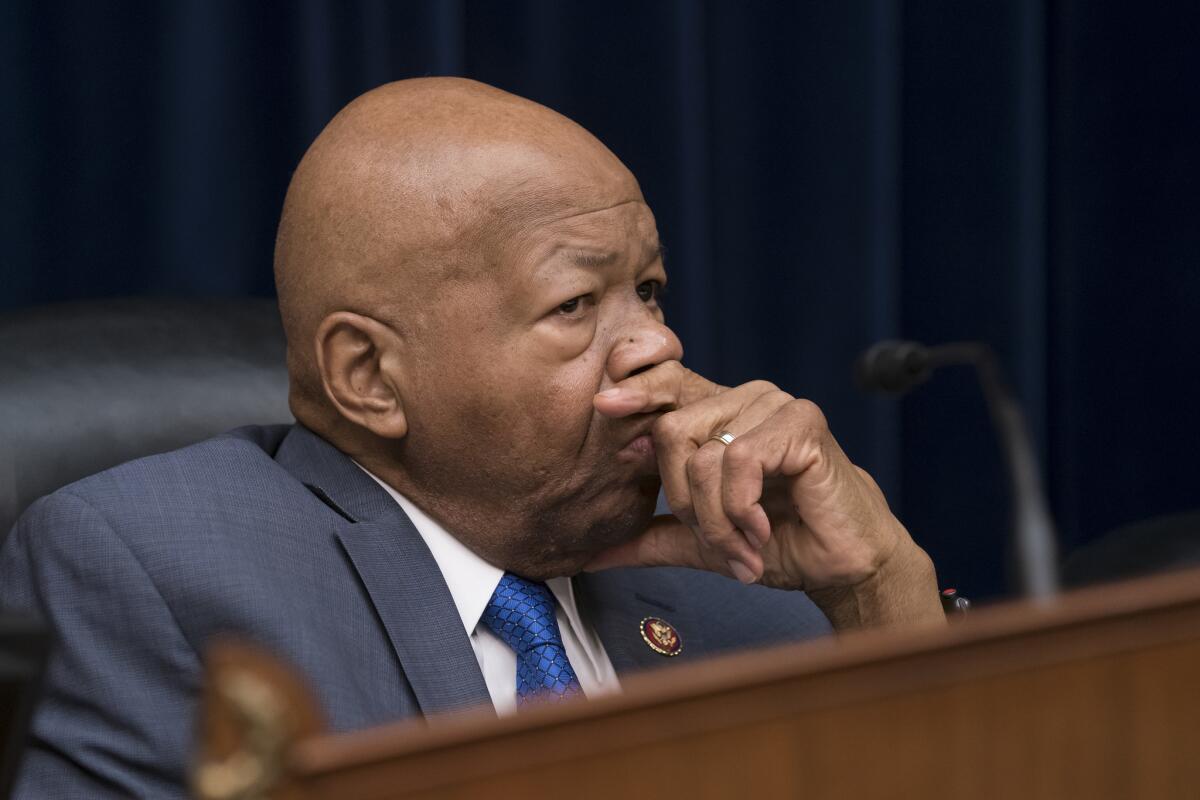We’re one step closer to seeing Trump’s financial records. That’s a win for oversight

- Share via
A federal appeals court poked another hole Friday in the wall of obstruction that President Trump has thrown in front of House investigators. A divided three-judge panel at the Court of Appeals for the District of Columbia Circuit held that Trump couldn’t block his accounting firm, Mazars USA, from responding to a subpoena from the House Oversight and Reform Committee for eight years’ worth of financial records from Trump and his businesses.
The president will undoubtedly appeal to stop the court’s order from going into effect, considering the gold mine of revelations about Trump and his real estate endeavors that’s at stake. Trump’s critics have long been straining at the bit to devour his tax returns and other detailed financial records, believing that they could be the key to proving that he engaged in self-enriching, shady or even illegal deeds as an investor, a candidate and ultimately as president. His defenders, meanwhile, have warned about giving lawmakers too much latitude to comb through a private citizen’s finances and to use congressional subpoena power to harass a president they don’t like.
There’s plenty of politics involved here, of course. But park your opinions about Trump and his antagonists for a moment to consider the fundamental questions the president’s lawyers are raising about power in Washington.
The Oversight Committee subpoenaed Trump’s financial records as part of a probe into allegations that Trump may have violated the law, most notably by making hush-money payments to two women before the 2016 election and by allegedly manipulating the reported value of some Trump properties. The president’s defenders argue that Congress isn’t allowed to usurp the judicial branch’s duties. In their view, the Oversight Committee was issuing subpoenas for a raft of documents hoping to find evidence of a crime, and that’s an abuse of power. Congressional subpoenas, they say, require a valid legislative purpose.
The D.C. Circuit agreed that a committee’s subpoenas must serve a valid legislative purpose. But it also noted that, under a 1929 Supreme Court ruling, just because information may be useful in a prosecution doesn’t mean that it may not also satisfy a legitimate legislative need. Subsequent rulings have made clear that the courts should focus on the legislative need, rather than trying to guess what motivated lawmakers to issue the subpoena.
According to the panel’s majority, once a committee has been granted the power to issue subpoenas, that authority is broad — albeit with “several key constraints.” It’s not a law enforcement agency, nor can its investigations violate individuals’ constitutional rights. Because its power to investigate is tied to its power to legislate, “Congress may investigate only those topics on which it could legislate.” And finally, even a valid legislative purpose cannot compel the submission of irrelevant material.
Those are sound, well-established guardrails. And they weren’t really disputed by Trump’s team; instead, the president’s lawyers argued that there was no legitimate legislative purpose to the Mazars subpoena. But that’s not what the record shows; Oversight Chairman Elijah E. Cummings (D-Md.) indicated in at least one letter to the White House and one memo to fellow lawmakers that in addition to helping determine whether the president may have violated the law, the information would help the committee review whether ethics and financial disclosure laws under its purview were effective. That’s a clear legislative purpose.
Trump’s lawyers also argued that the committee overstepped by training its investigatory sights on one specific person, namely Trump — a “particularity that is the hallmark of executive and judicial power,” not legislative authority. But it’s often the case that one person’s behavior illustrates a flaw in the law that Congress needs to address.
And contrary to the argument raised by the panel’s dissenting judge, Neomi Rao (a Trump appointee, for what it’s worth), a subpoena that could produce evidence of a president’s illegal behavior doesn’t have to be part of an impeachment process (although the Oversight Committee has since joined that effort), as long as it would also serve a legislative purpose. Otherwise, Congress couldn’t conduct any probes of possibly unlawful activity by the president unless it started down the impeachment path, which isn’t how lawmakers have acted over the years — witness, for example, the Iran-Contra investigation in 1987.
It’s worth asking whether the ruling gives lawmakers the green light to engage in abusive, privacy-demolishing fishing expeditions in the name of oversight. Just as bad facts can lead to bad laws being made, so too can bad presidents. The risk here cuts both ways; Trump’s battles with Congress raise the prospect not just of giving presidents and administrations too great a shield against scrutiny, but also too little.
That’s why the guardrails requiring a “legitimate legislative purpose” and barring the collection of irrelevant material are so important. The Oversight Committee must have the power to ensure that the Ethics in Government Act is being enforced and accomplishing its intended goal of protecting against conflicts of interest and other ethical land mines.
More to Read
A cure for the common opinion
Get thought-provoking perspectives with our weekly newsletter.
You may occasionally receive promotional content from the Los Angeles Times.










